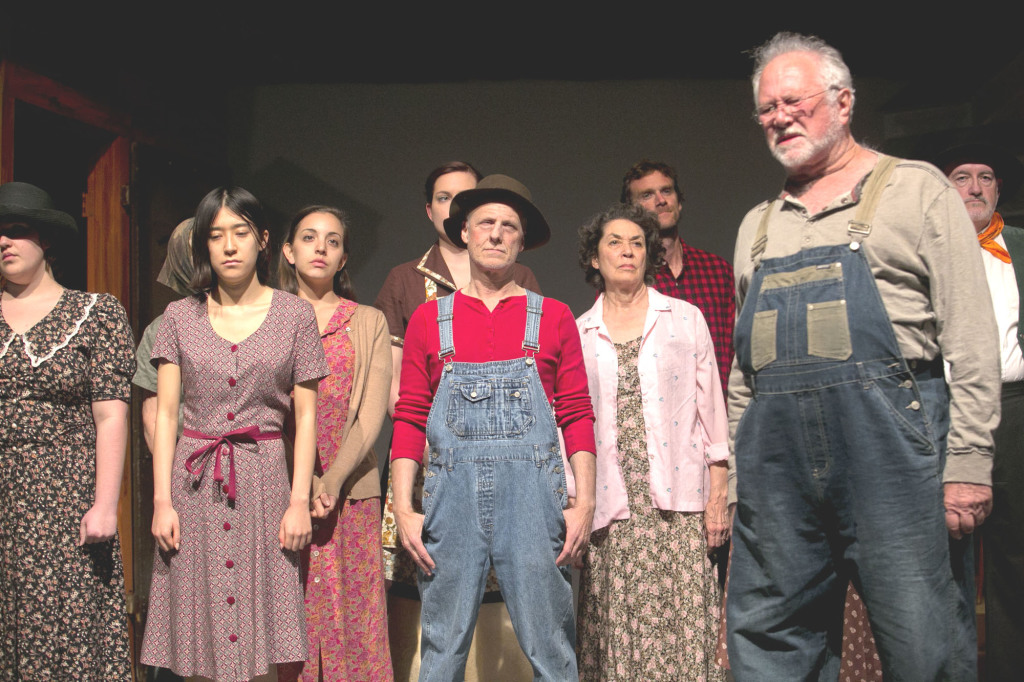
The cast of “Panhandle” (with playwright Walter Davis as the Old Man, front right), at the Live Oak Theatre in Berkeley through Jan. 31.
Anna Kaminska photos
A remarkably well-written story, “Panhandle,” with its detailed depiction of individuals and how the major events of the times affected their lives, has the feel of a historical novel. Davis was obviously moved by the stories of the thousands of farmers and their families whose livelihood was destroyed by a series of economic, environmental and political events completely beyond their control, beginning with the unprecedented stock market crash of 1929 that sent the value of cotton and other over-produced crops plummeting. The playwright’s compassion comes through vividly, enhanced by projected images of the destitute families and the horrific landscape of the period. The black-and-white and sepia photographs of the legendary dust storms and the land and structures they destroyed appear at key points during the play, culled from WPA (Works Progress Administration) archives.
As “Panhandle” opens, the “Old Man” (played by Davis) tries to explain the story to an agent of President Roosevelt’s WPA program (Chris Cruz) who has stopped by his general store hoping to offer the community some help. The young visitor seems confident and sincere, but he has arrived years too late. Davis is priceless in the role of the skeptical curmudgeon with his calm demeanor, jaded perspective and incisive sense of humor.
“I don’t think I understand you,” the young agent politely complains after the old man offers seemingly contradictory answers to his questions. “I don’t think you do” is his wry and confounding response — a perfect segue into the story’s first flashback.
Ben Grubb plays Orin, a young farmer with bold ideas for expanding his father’s business. As news of the stock market crash first comes in over the radio, Orin has just taken out a hefty bank loan to invest in additional acreage and new equipment.
Orin’s wife (Laura Espino as Clara) is his gentle champion, while his sister (Erika Bakse as “Sis”) is his harshest critic. Pa (Lee Vogt) surprises them all when he responds with hope and confidence to his son’s big news, glad to see him taking such a keen interest in building their future.Unfortunately, not all of the acting in the Berkeley production was up to the standard I have come to expect from the Actors Ensemble at the play’s opening night last Friday. Some key players tended to rush through their lines, making it difficult to hear everything they were saying, and some others appeared under-rehearsed. Those with solo singing parts strained to stay on key, and the accompanying pianist and guitarist, while adept, were at times out of sync with each other.
That said, the style of the music felt perfectly matched to the story, and the players were mostly well focused and engaged with each other, creating a smooth story flow. Davis was the clear anchor, consistently responsive and confident both in the “present-day” with the WPA man and as the neighbor and friend from scenes in the recent past. Bakse, Vogt and Anne Fairlie (“Ma”) also shone in their respective roles.
While opening night revealed some apparent weaknesses, I would strongly recommend seeing this show based on the play’s powerful narrative and excellent staging and the overall strength of the acting. It all adds up to a touching, informative and thought-provoking theater experience.
Go and learn something you may not have known about this period in America’s history, and come away with a renewed appreciation for the awful events endured by these families — tragic events that to this day resonate powerfully in the country’s rural communities.
If You Go
“Panhandle” continues at the Live Oak Theater, 1301 Shattuck Ave., Berkeley, through Jan. 31. Tickets are $15 to $20 and are available at www.aeofberkeley.com.
Elizabeth Warnimont is a freelance writer specializing in the performing arts. She is also a substitute teacher for the Benicia Unified School District.







Leave a Reply